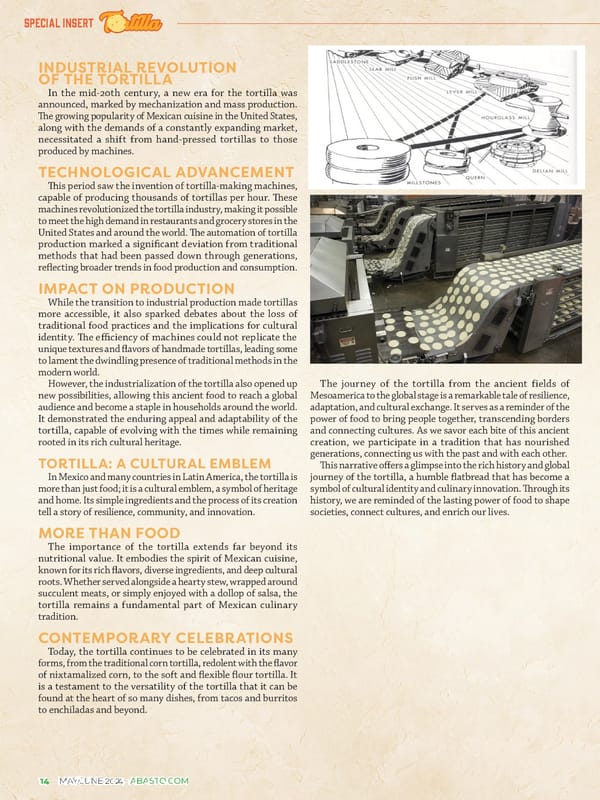special insert INDUSTRIAL REVOLUTION OF THE TORTILLA In the mid-20th century, a new era for the tortilla was announced, marked by mechanization and mass production. 吀栀e growing popularity of Mexican cuisine in the United States, along with the demands of a constantly expanding market, necessitated a shift from hand-pressed tortillas to those produced by machines. TECHNOLOGICAL ADVANCEMENT 吀栀is period saw the invention of tortilla-making machines, capable of producing thousands of tortillas per hour. 吀栀ese machines revolutionized the tortilla industry, making it possible to meet the high demand in restaurants and grocery stores in the United States and around the world. 吀栀e automation of tortilla production marked a signi昀椀cant deviation from traditional methods that had been passed down through generations, re昀氀ecting broader trends in food production and consumption. IMPACT ON PRODUCTION While the transition to industrial production made tortillas more accessible, it also sparked debates about the loss of traditional food practices and the implications for cultural identity. 吀栀e e昀케ciency of machines could not replicate the unique textures and 昀氀avors of handmade tortillas, leading some to lament the dwindling presence of traditional methods in the modern world. However, the industrialization of the tortilla also opened up The journey of the tortilla from the ancient fields of new possibilities, allowing this ancient food to reach a global Mesoamerica to the global stage is a remarkable tale of resilience, audience and become a staple in households around the world. adaptation, and cultural exchange. It serves as a reminder of the It demonstrated the enduring appeal and adaptability of the power of food to bring people together, transcending borders tortilla, capable of evolving with the times while remaining and connecting cultures. As we savor each bite of this ancient rooted in its rich cultural heritage. creation, we participate in a tradition that has nourished generations, connecting us with the past and with each other. TORTILLA: A CULTURAL EMBLEM 吀栀is narrative o昀昀ers a glimpse into the rich history and global In Mexico and many countries in Latin America, the tortilla is journey of the tortilla, a humble 昀氀atbread that has become a more than just food; it is a cultural emblem, a symbol of heritage symbol of cultural identity and culinary innovation. 吀栀rough its and home. Its simple ingredients and the process of its creation history, we are reminded of the lasting power of food to shape tell a story of resilience, community, and innovation. societies, connect cultures, and enrich our lives. MORE THAN FOOD The importance of the tortilla extends far beyond its nutritional value. It embodies the spirit of Mexican cuisine, known for its rich 昀氀avors, diverse ingredients, and deep cultural roots. Whether served alongside a hearty stew, wrapped around succulent meats, or simply enjoyed with a dollop of salsa, the tortilla remains a fundamental part of Mexican culinary tradition. CONTEMPORARY CELEBRATIONS Today, the tortilla continues to be celebrated in its many forms, from the traditional corn tortilla, redolent with the 昀氀avor of nixtamalized corn, to the soft and 昀氀exible 昀氀our tortilla. It is a testament to the versatility of the tortilla that it can be found at the heart of so many dishes, from tacos and burritos to enchiladas and beyond. 1144 MMAAYY//JJUUNNE 2E 20 02244 - - A ABBA ASSTTOO..CCOOMM
 Abasto Magazine - May/June 2024 Page 31 Page 33
Abasto Magazine - May/June 2024 Page 31 Page 33